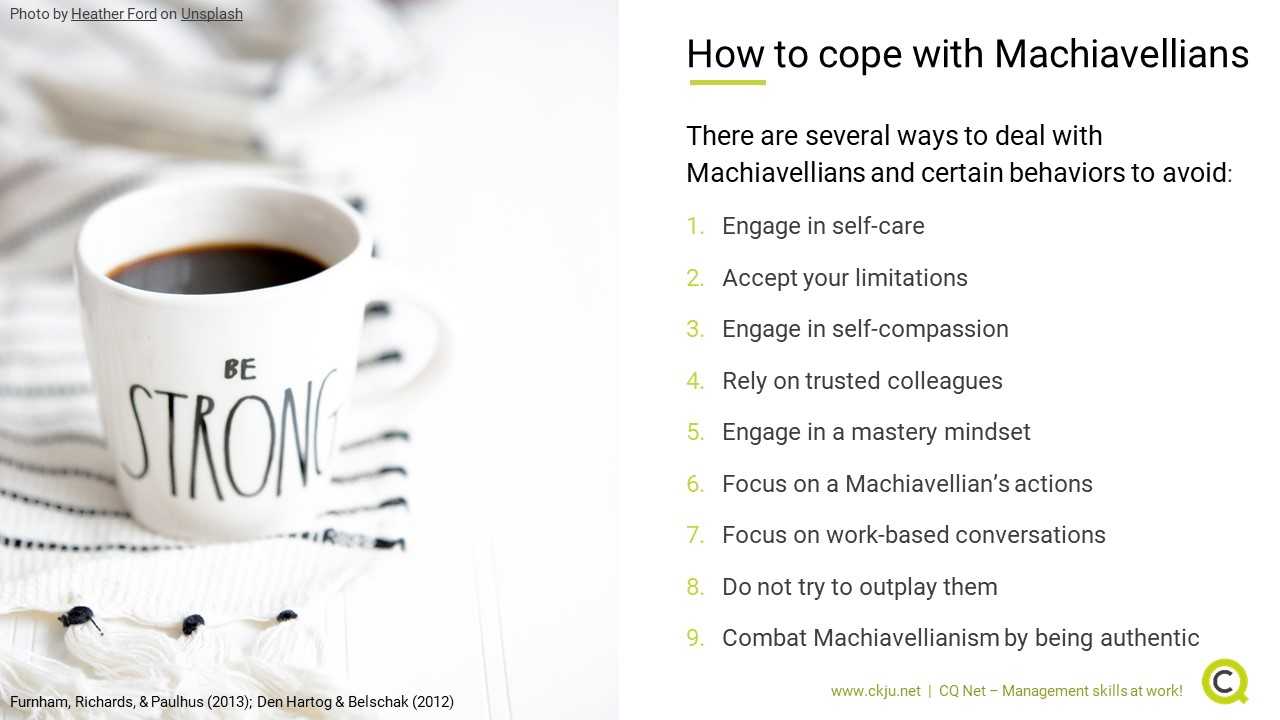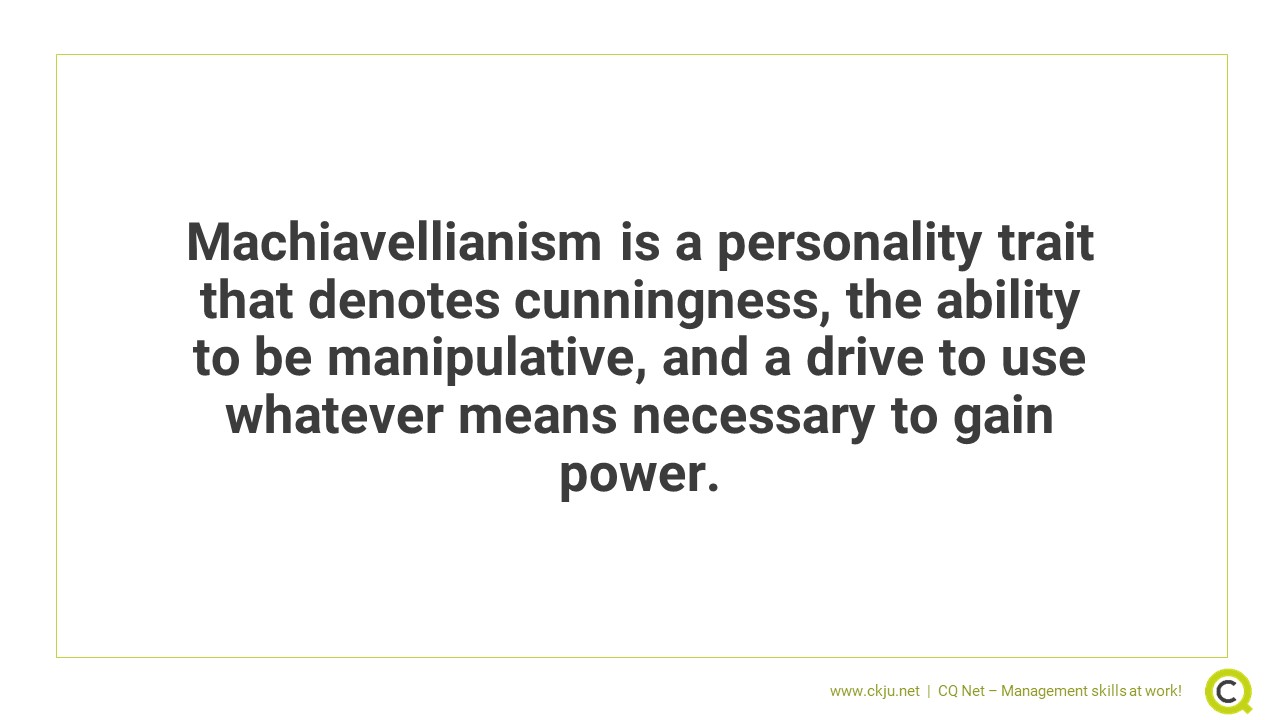- All Management Learning Resources
- Machiavellianism

Why you should care about Machiavellianism
While the term "Machiavellian" may be inspired by an author from the 16th century, Machiavellians are common in all kinds of settings. This particular combination of dark personality traits is highly damaging and should be met with caution. Machiavellian leaders or coworkers have negative effects on individuals and entire organizations. Therefore, it is vital to understand how Machiavellianism works and what can be done to cope with it.
Contents
What is Machiavellianism?
Machiavellianism is a personality trait that denotes cunningness, the ability to be manipulative, and a drive to use whatever means necessary to gain power. Machiavellianism is one of the traits that forms the Dark Triad, along with narcissism and psychopathy. Based on current datum, it tends to decrease in age and is more prevalent in men than in women.
Using strategies to gain power and prestige
The personality trait was described by Machiavelli in his book “The Prince”, written in the 16th century. Machiavelli wrote the book to describe how leaders could use strategies to gain power and prestige. The personality trait of Machiavellianism has also been described in contemporary studies of leadership (Judge et al., 2009); within the leadership arena, individuals who score high on Machiavellianism tend to be cunning, manipulative and will use whatever means necessary to gain political power.
Machiavellian leaders maximise their personal power
Machiavelli encourages leaders to lie, manipulate and use coercive persuasion to serve their own needs. Individuals who score high on Machiavellianism are not necessarily in a position of formal power but engage in techniques to boost their own self-worth. They are skilled in impression management techniques with a natural talent for influencing others with the main aim of maximizing opportunities for their own personal power.
Moral and ethical standards do not matter to Machiavellians
Machiavellians have little regard in adhering to moral or ethical standards. They focus on money, power and competition and place little emphasis on community building, self-care, and family commitment; they aim to win at any cost (Spielberger & Butcher, 2013). Within the workplace, Machiavellians engage in flattery, deceit, coercion and can be abusive (Calhoon, 1969).
How do we recognize Machiavellianism?
There are several ways to recognize machiavellians. From a scientific perspective, there is an inventory (Mach-IV) that was developed by Christie and Geis (1970) and is still viewed as the primary way to assess Machiavellianism.
The Mach-IV inventory helps assess Machiavellian traits
The Mach IV test consists of twenty questions and uses self-report. Those with a high score on the scale are more likely to be deceitful and lack empathy (Spielberger & Butcher, 2013). The Mach IV test includes items such as
- “The Best way to handle people is to tell them what they want to hear”,
- “It is wise to flatter important people,” and
- “the biggest difference between most criminals and other people is that the criminals are stupid enough to get caught.”
Individuals who respond in the affirmative are more likely to be a Machiavellian.
There are four ways to identify a Machiavellian
Empirical research suggests several ways to spot a Machiavellian in the workplace.
- Machiavellians perform well in work environments where the rules are ambiguous; for example, places where there is an emphasis on creativity can be ambiguous because the nature of innovation and creativity is chaotic leading to ambiguity on what is required. There is also evidence that Machiavellians do less well in company that are rules-based and they frequently ignore the set procedures of the institution (Grover & Enz, 2005).
- Machiavellians are unable to show the full range of emotions and can appear detached from situations. In fact, when distressing events occur whereby most individuals would display negative affect, Machiavellians gain pleasure from watching negative events unfold (Amorim, Sousa & Chamorro-Premuzic, 2009).
- Initially, Machiavellians will be charismatic and friendly. They will use both soft and hard tactics to obtain their objectives such as using self-disclosure; however, they will also attempt to make someone feel guilty (Jonason, Slomski & Partyka, 2012).
- Machiavellians perform well in competitive environments and initially, colleagues will find Machiavellians friendly because they use soft tactics to gain commitment (Jonason et al., 2012). However, over time, Machiavellians tend to lose favour as colleagues detect the inauthenticity of their actions.
Machiavellians use certain strategic behaviors
In an HRM article that focused on the dark triad traits of narcissism, Machiavellianism and psychopathy, Schyns and colleagues identified negative strategic behaviors that Machiavellians use (Schyns, Wisse, & Sanders, 2019).
- Unlike narcissists, Machiavellians do not have to be the center of attention and are satisfied as being puppeteers, who pull the strings.
- They try to minimize the influence of others and withhold knowledge with colleagues. They use manipulation to reach their goals while scheming for personal benefit. They tend to compete rather than be cooperative (Schyns et al, 2019).
- Within the workplace they will also entice coworkers to engage in risky behaviors and will try to seduce their coworkers or supervisors into romantic relationships to suit their own ends (Schyns et al., 2019).
How to cope with Machiavellians
There are several ways to deal with Machiavellians and certain behaviors to avoid. Based on the empirical literature on the behaviours and characteristics of Machiavellians (e.g., Furnham, Richards, & Paulhus, 2013), there are several ways to deal with them:

Engage in self-care
Machiavellians can be destructive and can prey on the good nature of colleagues through using a mixture of soft and hard tactics such as seduction and bullying. This kind of behaviour can have a deleterious effect on psychological well-being. Consequently, it is important to set boundaries and to consider speaking with a clinician who can help in reducing anxiety and stress from dealing with a Machiavellian.
Accept your limitations
Because Machiavellianism is a personality trait (Furnham et al., 2013), it is important to accept that you cannot change the person. Personality traits are relatively stable across situations. When Machiavellians find opportunities to exploit others, they will do so if the environment allows it. Consequently, the environment is important to consider because it can increase a Machiavellian’s destructive behaviour. It is best if you limit your interactions with a Machiavellian.
Engage in self-compassion
Machiavellians tend to prey on those who are kind and considerate. They will appeal to this type of person to gain empathy when divulging their life issues. This can lead to exploitation and you might find yourself in a vulnerable position. It is important not to engage in derogation of yourself but to engage in self-compassion and to reach out to supportive others.
Rely on trusted colleagues
It is important to talk with colleagues, whom you trust so you can break away from the grip of the Machiavellian. A colleague can also provide impartial advice because they are not part of the toxic relationship and can help you to break away from the situation. A trusted colleague will point out the facts and can help deal with the emotional toil of the toxic relationship.
Engage in a mastery mindset
Machiavellians want to win so it is important that you also focus on your work goals and not be blind-sided by their manipulative strategies. The best way to do this is to engage in mastery mindset strategies whereby you strive to do well and reach your objectives rather than try to beat the Machiavellian.
Focus on a Machiavellian’s actions
Machiavellians will try to deceive you with promises to win your trust. This is a common strategy that they use to meet their personal ends. It is important to rely on your instinct and focus on what Machiavellians do rather than what they say. Machiavellians engage in behaviours that demonstrate their unethical standards and many of these behaviours are easy to identify (Den Hartog & Belschak, 2012).
Focus on work-based conversations
When conversing with a Machiavellian, it is important to discuss work-based topics. When you discuss your personal life with a Machiavellian, they might use this information to their own personal advantage. It is important to remember that they are not a trusted confidante.
Do not try to outplay them
It is important that you don’t engage in the same strategies as a Machiavellian. If you do so, they will be more effortful in their strategies. It is best to use ethical strategies.
Combatting Machiavellianism by being authentic
The most important advice is to remember your core values and to adhere to principles and set objectives that meet these values. Focus on displaying your positive personality traits in the workplace and strengthen your own self-worth. These positive traits will help you succeed in the workplace. The behaviour exhibited by Machiavellians does not negate your self-worth.
Key recommendations for professionals
- Be aware of and wary about leaders, co-workers or others with dark personality traits
- Understand the key components of Machiavellianism and keep an eye out for individuals who pull the strings in the background, who try and influence others, manipulate them, and who try to initiate risky behavior in others.
- Protect yourself from the negative effects of Machiavellians by setting boundaries, keeping a distance and being wary of how they could be exploiting your own vulnerabilities.
- Focus on work-based topics when conversing with a Machiavellian at work.
- Build a support network of trusted colleagues and allies.
- Harbour and invest in building and nurturing positive personality traits that help nurture healthy relationships
References and further reading
Amorim, A.F., Sousa, I & Chamorro-Premuzic, T. (2009). Empathy deficits and trait emotional intelligence in psychopathy and Machiavellianism. Personality and Individual Differences, 47(7), 758–762.
Calhoon, R. P. (1 June 1969). "Niccolo Machiavelli and the Twentieth Century Administrator". Academy of Management Journal. 12 (2): 205–212.
Christie, R., & Geis, F. L. (1970). Studies in Machiavellianism. New York: Academic Press.
Den Hartog, D., & Belschak, F. D. (2012). Work Engagement and Machiavellianism in the Ethical Leadership Process. Journal of Business Ethics, 107(1), 35–47.
Furnham, A., Richards, S. C., & Paulhus, D. L. (March 2013). "The Dark Triad of Personality: A 10 Year Review"(PDF). Social and Personality Psychology Compass. 7 (3): 199–216
Grover, S. L, & Enz, Cathy A. (2005). The Influence of Company Rules, Ethical Climate, and Individual Characteristics on Sales Representative's Honesty. Journal of Management & Organization, 11(2), 27–36.
Jonason, Peter K, Slomski, S., & Partyka, J. (2012). The Dark Triad at work: How toxic employees get their way. Personality and Individual Differences, 52(3), 449–453.
Judge, T., Piccolo, R., & Kosalka, T. (2009). The bright and dark sides of leader traits: A review and theoretical extension of the leader trait paradigm. The Leadership Quarterly, 20, 855–875.
Schyns, B., Wisse, B., & Sanders, S. (2019). Shady Strategic Behavior: Recognizing Strategic Followership of Dark Triad Followers. AMP, 33, 234–249.
Spielberger, C. D. & Butcher, J. N. (2013). Advances in Personality Assessment. Routledge.
About the Author







